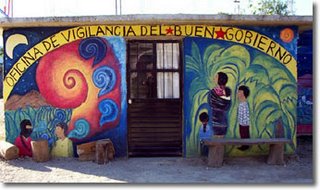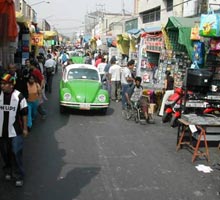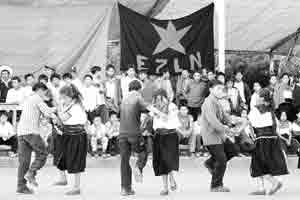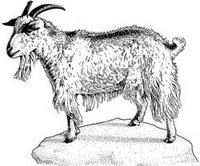
The Society of the Different
Part 1: The Center of the World
Oaxaca, Oaxaca, Mexico
...the logic of interest in the government and the logic of interest among the people never coincide.
With some friends I started to create an autonomous niche in the so-called civil society where I have been working since then.
Autonomy, Decentralism, “Gestion”

“Autonomy”, you know the whole story today of autonomy. This was in 1980, that means in that time we had started to accompany the struggle for autonomy with the people in the villages.
“Decentralism” is the opposite to decentralization. “We don’t want to have any center. We are the center of the world.” Everyone is the center of the world. Every community is it’s own center. We were supporting that kind of attitude.
And “gestion”, gestión cannot be translated to English. It is something like self-management. Butyou can have one organization that is protecting against the impact of the bureaucracy on the people. The people need to do something with the bureaucrats

...in 1985 with the big things of the earthquake in Mexico City, that is now considered the moment in which the expression “civil society” was born in Mexico to express an idea of autonomy by the people, in the hands of the people.
...“Non-violence is for the strong,” said Gandhi. “It would be criminal if I preach non-violence to a mouse on the point of being devoured by a cat. If I am preaching non-violence to the Hindu it is because I don’t see why 300 million people are afraid of 150,000 British. Because they are strong, they should use non-violence.”

The first Zapatistas used violence as the last resource.
But then they became the strong very soon because of our support. When we had millions of people in the streets and great massive support, even international support, immediately they became the strong and they became the champions of non-violence. This is one of the most paradoxical elements of the Zapatistas. They are an army that is the champion of non-violence in Mexico.
...democracy is still associated with the notion of power - those governing and those governed
What the Zapatistas and we are saying is that we are affirming our dignity, affirming who we are and taking control of our lives. It is not a different system of power. We are not trying to manipulate or control anyone.
Radical democracy also implies the transition from the language of rights to the language of freedom. If we accept the very idea of right then we need to give all the power, the resources, to the state, to any kind of central structure that will provide the things to which we have the right to

A community is, here in Oaxaca, in any village, even the village where I live, it is a group of people linked by obligation, by mutual obligations, not by rights.
One final element that is very much connected with the Zapatistas is that we are trying to go from tolerance to hospitality. The dictionary says that “tolerance” is “to suffer with patience” and sometimes the people that tolerate lose their patience
We are saying that we are talking about hospitality that you accept profoundly that he has the same right that you have to be here on the planet.

Gandhi was continually showing that the people themselves, by themselves, can exist and do something, whose main concern in his daily life for fifty years was the daily chores, the daily problems of living. In the film, they cut this moment in which Nehru and Patel are with Gandhi, at a very critical moment for very important decisions about independence, and Gandhi interrupts the conversation saying, “Please excuse me for a moment I need to go and milk my goat.”
I think the Sexta, the Otra Campaña, is just the confirmation of this kind of concern: not the big abstract words but the real concerns of the people.

I cannot share with you the kind of emotion that I perceive with the dry toilet when the people disconnect their stomach from any centralized bureaucracy. If you have a flush toilet you are fully dependent on a private or public bureaucracy that is taking your own shit out of your house. When you have a dry toilet you are really autonomous and you are responsible for disposing of your own shit, and, the most important point, for transforming your own shit into something positive, into a magnificent compost.
Gandhi is perhaps the only political leader really concerned with real life concerns. This is for me a very effective symbol of a new kind of politics.
(What of the) Salt March as autonomous methods of being or organizing? It was used as a method of organizing but it was also “Let’s just do what we need to do without the British, as far as making our own clothing and making our own salt”?

We don’t need to pay the tax. “There is no need for us to accept that and this government is absolutely impotent. They can do nothing if all of us do this.”

The caracol is our salt.
It is saying “No” to the government. They have been governing themselves in their own way with magnificent organization and showing that a people can govern themselves without a center.
Hope is the very essence of popular movements: people mobilize only when they have hope. The Zapatistas opened hope and stimulated imagination. If you eliminate this structure and you start thinking, then you discover that there are a lot of things that you can do by yourselves.

“Be the change you wish for the world”, instead of preaching to everyone what to do. You have people in the left, with a fundamental contradiction between their discourse and their practice. They can be very, very radical and live like a bourgeois

Zapatistas Neo-liberalism Subcomandante Marcos Gustavo Esteva
No comments:
Post a Comment